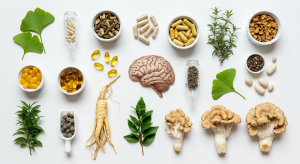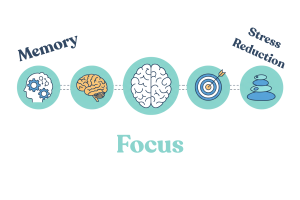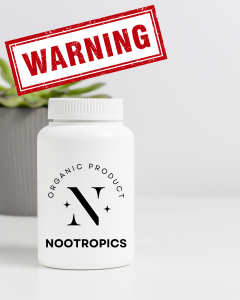The Student’s Guide to Safe Cognitive Enhancement: What You Need to Know About Nootropics
Academic pressure is at an all-time high. With increased competition for grades, internships, and career opportunities, it’s no surprise that students are looking for every possible advantage to boost their mental performance.
Recent surveys indicate that over 30% of students have experimented with some form of cognitive enhancement, often turning to prescription stimulants like Adderall or Ritalin without a prescription—a practice that’s both dangerous and illegal.
But there’s a safer path forward. Let’s explore the world of nootropics—legal, researched cognitive enhancers that might help you perform at your peak without the serious risks.
 What Exactly Are Nootropics?
What Exactly Are Nootropics?
Nootropics, sometimes called “smart drugs” or cognitive enhancers, are substances designed to improve cognitive function, particularly memory, creativity, focus, and motivation in healthy individuals.
Unlike prescription stimulants, legitimate nootropics are:
- Legal and available without prescription
- Generally safer with fewer side effects
- Researched for cognitive benefits
- Non-addictive when used properly
The term was coined by Romanian psychologist Corneliu Giurgea in 1972, who established specific criteria that true nootropics must meet, including enhancing learning and memory while being relatively non-toxic.
The Science Behind Cognitive Enhancement
For over 50 years, researchers have been studying compounds that could safely enhance human cognitive performance. While we’re nowhere near the fictional NZT-48 from the movie “Limitless,” legitimate research has identified several promising natural and synthetic compounds.
These substances work through various mechanisms:
- Increasing blood flow to the brain
- Supporting neurotransmitter production and function
- Protecting neurons from oxidative stress
- Enhancing cellular energy production in brain cells
Evidence-Based Benefits of Nootropics
Enhanced Memory and Learning
Certain nootropic compounds have shown promise in research studies:
Huperzine A: Derived from Chinese club moss, this compound may help preserve acetylcholine, a neurotransmitter crucial for learning and memory.
Bacopa Monnieri: This herb has been used in traditional Ayurvedic medicine for centuries. Modern studies suggest it may improve memory formation and recall.
Lion’s Mane Mushroom: Research indicates this mushroom may support the production of nerve growth factor, potentially supporting brain plasticity.
Improved Focus and Attention
Rhodiola Rosea: Studies published in peer-reviewed journals suggest this adaptogenic herb may help improve mental fatigue and concentration, particularly during stressful periods.
L-Theanine + Caffeine: This combination, naturally found in tea, has been shown to improve focus while reducing the jittery effects often associated with caffeine alone.
Stress Management
Ashwagandha: Research suggests this adaptogen may help regulate cortisol levels, potentially reducing stress and improving cognitive performance under pressure.
Phosphatidylserine: This phospholipid may help support healthy stress hormone levels and cognitive function.
What Students Should Know Before Trying Nootropics
The Realistic Expectations
Nootropics aren’t magic pills. They typically provide:
- Modest improvements in focus and clarity
- Better stress management during high-pressure periods
- Slight enhancement in memory formation and recall
- Improved mood and motivation
Don’t expect dramatic, movie-like transformations in intelligence or capability.
Safety Considerations
While generally safer than prescription stimulants, nootropics still require careful consideration:
- Start with single ingredients rather than complex blends
- Research quality brands that provide third-party testing
- Consult healthcare providers, especially if you take medications
- Monitor your response and discontinue if you experience adverse effects
- Avoid dependency by cycling usage and taking breaks
Cost-Benefit Analysis
High-quality nootropics can be cost-effective compared to:
- Daily coffee shop visits ($150-300/month)
- Energy drinks and supplements ($100-200/month)
- Potential health costs from unsafe stimulant use
However, the most important “supplements” for cognitive performance remain free: adequate sleep, regular exercise, proper nutrition, and effective study techniques.
Alternatives to Consider First
Before turning to supplements, optimize these foundational elements:
Sleep Hygiene
- Aim for 7-9 hours of quality sleep
- Maintain consistent sleep schedules
- Create a sleep-friendly environment
Nutrition for Brain Health
- Eat omega-3 rich foods (fish, walnuts, flaxseeds)
- Include antioxidant-rich berries and leafy greens
- Stay adequately hydrated
- Limit processed foods and excessive sugar
Exercise and Movement
- Regular cardio improves brain blood flow
- Even short walks can enhance creativity and focus
- Yoga and meditation can improve stress management
Study Techniques
- Use spaced repetition for better retention
- Practice active recall instead of passive re-reading
- Implement the Pomodoro Technique for sustained focus
Red Flags to Avoid
Be wary of products that:
- Make unrealistic claims about dramatic IQ increases
- Don’t disclose ingredient amounts (proprietary blends)
- Lack third-party testing or quality certifications
- Are marketed with aggressive, fear-based tactics
- Contain undisclosed pharmaceutical ingredients
The Bottom Line
Nootropics may offer modest cognitive benefits for some students, but they’re not a substitute for fundamental healthy habits. If you’re considering cognitive enhancers:
- Start with the basics: Optimize sleep, nutrition, and exercise first
- Do your research: Look for peer-reviewed studies on specific ingredients
- Choose quality: Invest in reputable brands with transparent testing
- Set realistic expectations: Expect subtle improvements, not miracles
- Monitor your health: Pay attention to how you feel and perform
Remember, the most powerful cognitive enhancer is a well-rested, well-nourished, and well-trained brain. Nootropics might provide a slight edge, but they work best as part of a comprehensive approach to academic and cognitive wellness.
Your brain health is an investment in your future. Make informed, safe choices that support your long-term success rather than seeking quick fixes that might compromise your wellbeing.
Priscilla, Cliff’s Mom♥
Disclaimer: This article is for educational purposes only and does not constitute medical advice. Always consult with healthcare professionals before starting any supplement regimen, especially if you have medical conditions or take medications.



